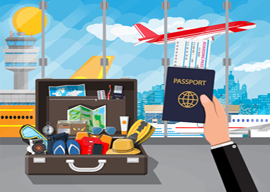
May 12, 2018

Source: Bigstock
Then a miracle happened. We found the passport at the last attempt. It had somehow insinuated itself into a crevice in the case in which it should have been all along. Suddenly the world regained its bloom—it even seemed more brightly colored—and I forgave the imaginary bureaucrat all his faults. Indeed, I even began to sympathize with him for having to deal so constantly with those irresponsible fools who didn’t keep proper care of their passport and expected him to issue them another in a few moments, as if there were no possibility of fraud and misrepresentation, as if everything were set up merely for their convenience. I forgot immediately the content of the querulous letters of complaint that I had already written in my head to the Foreign Secretary, in which I protested at the callous, indifferent, and inefficient way with which I had been treated by his officialdom, for whose salaries my taxes paid. I began to see things from the bureaucrat’s point of view.
The pleasure of recovering my passport was so great that I wondered whether losing it in the first place had not been a most fortunate event. The Buddha taught that the cost of every pleasure was the pain that succeeded it, and therefore that the price of avoiding pain was the avoidance of pleasure. But could it not be that, by the same token, the reward of many pains (certainly not all of them, of course) is pleasure? Certainly, I had never appreciated the possession of my passport to even the tiniest extent by comparison with my appreciation of it after we found it again, an appreciation that approached ecstasy. I remember also the pleasure I experienced when the crisis of viral pneumonia that I suffered as a young man was over. The crisis was terrible; the bed shook, and the bedding, including the mattress, was soaked through. But I knew beyond doubt the moment it was over that I was cured, that the illness would not return. And though I was still weak, even my weakness was delicious to me, a kind of bliss unknown to those who have never come through a crisis of pneumonia.
Is life more pain than pleasure? There can be no final answer. Not even an individual could provide an accounting until his life has been lived; and not even then, for his final assessment comes too late to be expressible and would in any case be too much colored by his last experiences to be objective. All that one can say is that pain and pleasure are intimately linked, and the possibility of the one implies the possibility of the other.
Comments on this article can be sent to the .(JavaScript must be enabled to view this email address) and must be accompanied by your full name, city and state. By sending us your comment you are agreeing to have it appear on Taki’s Magazine.